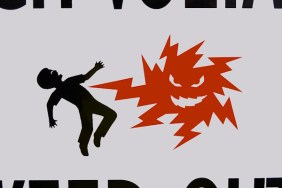Fire tornadoes rank right up there with the strangest, scariest and most spectacular natural phenomena though they often arise as a result of human-caused misadventures. Also known as fire whirls or fire devils, fire tornadoes can rage for more than 20 minutes, uproot 50ft tall trees and rise hundreds of feet into the atmosphere.
An Unpleasant Twist
(images via: TTBTS Disclosure and National Geographic)
Fire tornadoes superficially resemble “ordinary” tornadoes in appearance but as frightening as a meteorological twister can be, adding fire to the mix amps up the fear factor to nightmarish levels. They’re also extremely unpredictable, forming in a matter of seconds and petering out just as quickly. The pair of images above show a forest fire raging on the slopes of Mauna Kea volcano in Hawaii; without and (suddenly) with a fire tornado.
A Spin In The Outback
(image via: Business Insider)
“These really large-scale fire tornadoes occur at least once every year somewhere in the U.S.,” according to Jason Forthofer, a mechanical engineer at the U.S. Forest Services’s Missoula Fire Sciences Laboratory in Montana. “If we can identify conditions that are conducive to fire whirls, that would be a heads-up for firefighters because there have been some [people] that have been burned by them.” Filmmaker Chris Tangey narrowly avoided becoming one such statistic while scouting locations near Curtin Springs, Australia, in 2012. The fire whirl he captured photographically above is estimated to have been 100 feet or roughly 30 meters in height.
Smoke On A Rope
(images via: NOAA)
While obeying the same physical laws as other more typical weather conditions, fire tornadoes can also induce meteorological phenomena such as clouds. The short-lived fire tornado documented above by SkyWarn storm spotter Kelly Schwartz near Langdon, ND, is a perfect example. In a span of just 3 minutes on the afternoon of October 24th, 2011, a “tornadic rope” spinning above a grass fire lifted moist air almost 4,000 feet skywards, producing a what’s known as a pyro-cumulus cloud.




